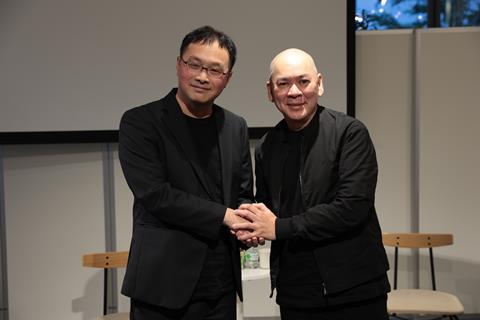
Award-winning directors Koji Fukada and Tsai Ming-liang voiced concerns about the state of filmmaking in Japan and Taiwan respectively during an on-stage conversation at Tokyo International Film Festival (TIFF).
Tsai, whose films have won top prizes at Cannes, Venice and Berlin, reflected on the rich period for Taiwanese art cinema that began in the 1980s with the emergence of directors like Hou Hsiao-hsien and Edward Yang before lamenting the move into genre features to make a profit.
“That was a great period for Taiwanese films, but in recent years, the industry is more interested in generating a profit through genre films and so on,” said Tsai. “But it’s great to see talented young directors like you and Ryusuke Hamaguchi emerging from Japan.”
Fukada added that while the situation in Japan might look good from outside, things are far from ideal in his view. “I think it’s a difficult environment for young directors here in Japan,” he said, citing recent efforts – in which he is playing an active role – to establish an organization like France’s National Centre for Cinema and the Moving Image (CNC) in Japan.
Fukada cited the same 1980s period of Taiwanese cinema – including the films of Tsai himself – as a huge influence on himself and other directors of his generation.
“When I saw your film Vive L’Amour, I thought to myself, ‘Wow, you can make films like this?’,” he recalled. “Until then, I thought films needed a definitive climax, but you helped me realize you can leave things to the audience’s imagination.”
During their hour-long discussion, part of the festival’s TIFF Lounge series, both directors also heaped praise on Europe’s filmgoers for their arthouse tastes in addition to its institutions.
“In Asia, audiences are largely interested in entertainment films, but in Europe, they’re used to going to see art films,” said Tsai.
Fukada agreed, citing Europe’s high cinematic literacy, including film studies classes taught in primary school. “There are often more people in France willing to see my films than in Japan, which makes me feel a bit conflicted,” said the director. “I think it’s important to educate people in Japan about films from an early age, too.”
Despite the financial pressures in their respective territories, both directors declared their intention to keep making films in their own way.
“I’ve never had a huge hit, but when I look back at my filmography, I feel satisfied,” said Tsai. “I feel like my films have a long shelf life.”
“I also want to make films that last for a long time, even after my death,” agreed Fukada. “After all, I’ve been touched by so many films from the past.”
Approach to style and actors
TIFF is celebrating Tsai as this year’s director in focus with screenings of several of his films, including Rebels Of The Neon God and Goodbye Dragon Inn. Fukada received the same honour in 2020.
The two directors, meeting for the first time, started by sharing their admiration for each other’s work.
“Harmonium really touched me,” said Tsai about Fukada’s Cannes jury prize-winning film from 2016. “I really believed in the characters and felt a great deal of empathy for each of them.”
Fukada was equally effusive about the veteran Taiwanese director. “I’ve been watching your films for decades,” said Fukada. “I’d like to go back in time and tell my younger self that I’d someday share a stage with Tsai Ming-liang.”
The two directors, possibly paired by the festival programmers for their similar filmmaking styles, shared their philosophies on creating quiet, realist films.
“What’s most important for me in films – what I always want from them – is sensitivity,” said Tsai. “I want the audience to believe that people like my characters could really exist.”
The director added that while he’s known for realism, “I also like to add some surreal elements in my films, because I think we all experience surreal moments in our lives sometimes.”
A huge factor in the style of their films, the directors agreed, comes down to how they work with actors.
“I don’t actually discuss things with my actors that much,” said Tsai. “I think the most important thing is to build the correct atmosphere for them. My films rely more on atmosphere than dialogue, so constructing that environment for them is vital.”
Fukada commented that in Japan, there isn’t often a lot of time to prep with actors before a shoot, but that he tries to make his films an exception.
“Meeting with actors before the shoot really helps to build a sense of trust,” said Fukada. “Acting isn’t just about fitting a director’s image of a scene, it’s about communication. I think that’s where the reality of a scene is born.”
The TIFF Lounge talk series will continue throughout the festival, which runs until November 2.
Quotes are translated from Japanese. Tsai Ming-liang’s quotes were via a Chinese-Japanese interpreter.
























No comments yet